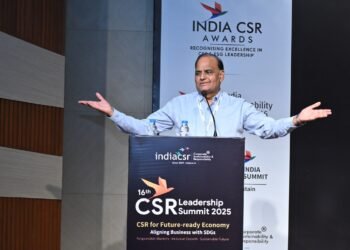Globally, BT has ambitious objectives to help raise £1billion for good causes by 2020 and inspire two thirds of its people to volunteer: Niall Dunne, Chief Sustainability Officer
NEW DELHI (India CSR): Chief Sustainability Officer Niall Dunne works with the BT Group’s Chief Executive, Chairman and executive management team to advance BT’s leadership as a responsible and sustainable business. Before joining BT, Niall spent a decade leading sustainability practices in Saatchi & Saatchi and Accenture, and also founded Bluvolution Ltd, a sustainability consultancy focused on the consumer foods and agricultural industries. Niall was selected by the World Economic Forum as a Young Global Leader (YGL) in March 2012. This honour is bestowed each year to recognize the most distinguished young leaders from around the world. Past YGLs include David Cameron and Google co-founder, Larry Page.
Niall also sits on WEF’s Sustainable Consumption Global Agenda Council. The council is responsible for identifying breakthrough ideas and new pathways to advance critical issues and ensure progress is made on sustainable consumption globally. From Glenageary in Dublin, Niall was one of Ireland’s top 800 metre runners. He holds a Bachelor of Science degree from Manhattan College in New York.
In an exclusive interview with Rusen Kumar, Editor of IndiaCSR; Niall Dunne, Chief Sustainability Officer, BT Group shared BT’s vision on various social projects in India and worldwide. Here are the edited excerpts of the interview:
Can you talk about the recent visit of Rio Ferdinand and Robbie Savage to Delhi and what role did BT play here?
Globally, BT has ambitious objectives to help raise £1billion for good causes by 2020 and inspire two thirds of its people to volunteer. In India, The Supporters Club, BT Sport’s charitable initiative which funnels BT Sport UK customers’ donations into good causes has previously backed the Amos Trust (which support hundreds of children living in and around the railway station in Chennai, providing access to healthcare and education), and, the British Council which runs the “Kolkata Goalz” in partnership with the English Premier League, using football to develop a brighter future for young people.
And last week Rio Ferdinand and Robbie Savage, the former international footballers and now presenters on BT’s UK sport’s TV network, BT Sport, visited India to highlight the significant work BT does in supporting charitable projects in the country and around the world. We also visited an Arsenal Soccer school in Delhi that teaches children to develop their football skills whilst encouraging their holistic development. The Arsenal soccer school, run by India On Track, has not received charitable backing from BT. The visit came about due to the deep UK relationship between BT Sport and Arsenal around marketing and content.
How was the experience for these footballers? Anything in particular that they would like to highlight?
BT, through The Supporters Club, has helped thousands of youngsters to improve their lives through the power of sport around the world, including in India. I had heard lots about the work of the projects we were visiting in Delhi and it was so inspiring to meet the youngsters and those who work to support them.
Details on BT’s CSR projects in India. Can you share a short brief on each of them?
In 2002, BT helped Delhi-based charity Katha to establish the Katha Information Technology and e-commerce School (KITES) in the heart of Govindpuri – Delhi’s largest slum area. The school equips children from the poorest communities with information and communication skills, ranging from basic computing skills to complex software programming. By working with Delhi’s poor communities, Katha and BT are trying to break the cycle of poverty that sees many young people drop out of education to take up low-income jobs. This year, Katha has supported over 3,000 beneficiaries directly, as well as over 40,000 children through the government schools programme. BT operations in India have also partnered with St Crispin’s – a registered charity in Pune, for building an IT Training Centre which provides a residential home and school for 675 underprivileged children.
Further, there are also some important initiatives that BT has been associated with:
Naz: Goal is a women’s empowerment program that works in urban communities, offering weekly sessions to adolescent girls who may or may not attend school and who are subsisting on a low family income. Goal ensures attendance by providing fun & safe places to play Netball. This program imparts life skills by educating young women on topics which include health, rights, communication, financial literacy & teamwork. This has been supported by The Supporters Club.
Magic Bus: Coupled with a focus on supporting young people to enrol and complete their education, this helps them see there is a way out of gruelling poverty for themselves and their families. Working with the government and other agencies, Magic Bus has identified a critical need to support young people to step up from education and into formal employment. This has been supported by Sport Relief, the UK sporting fund-raising event, which BT has backed for many years.
Butterflies: Butterflies is a local organisation working with vulnerable street and working children. They deliver programmes that include informal education, health care, support to younger people for vocational training and enterprise. Its innovative model includes a children’s savings and loans scheme, and child ‘doctors’ who act as a first point of call for street children with health problems. Butterflies have been successful in influencing government policies, especially on improved child protection. Butterflies is deeply committed to the participation of children in all their programmes and they have developed alliances and networks with similar organisations across South Asia. More than 60,000 children will have better access to education, healthcare, life skills and vocational skills, safe places for play, sports opportunities, and legal assistance. This has been supported by Sport Relief, the UK sporting fund-raising event, which BT has backed for many years.
For how long has BT been associated with Naz Foundation? Can you share more details on this project?
Since the middle of 2015, The Supporters Club, BT Sport’s charitable initiative which funnels BT Sport UK customers’ donations into good causes, has backed Women Win who deliver a programme in partnership with The Naz Foundation, to strengthen the work already delivered by Naz via their Goal Programme. Goal is delivered twice a week to young women, integrating netball and lifeskills education. This focuses on promotion of self-confidence, communication skills, health and hygiene and financial literacy. Once girls complete the 10 month programme they have the opportunity to become Goal Champions, who are trained to deliver the programme themselves. The aim of this programme is to establish Naz as a centre of excellence. The project will directly benefit 2,310 young people aged 12-20 (1,490 female and 820 male) in Delhi and Mumbai who are living with or at risk of HIV and at risk of exploitation and abuse. “
Can you elaborate on BT’s support to “Sports for Change” initiative by Magic Bus?
BT has supported Sport Relief, a UK charity for over 20 years. In turn, Sport Relief has made a grant to Magic Bus, one of the region’s most credible education to livelihood NGO’s. Over the last ten years Magic Bus has used Sport for Change initiatives to help build the confidence and skills of over 250,000 young people in India with 2 programs. Two small pilot schemes have provided core skills alongside specific training for targeted work. These have helped young people from some of the most deprived slums to get jobs. This programme will build on the pilots, testing further models, and helping 1,000 young people into long term employment.
How is BT associated in the programs by Butterflies? Kindly elaborate on this?
BT has supported Sport Relief, a UK charity for over 20 years. In turn, Sport Relief has provided a grant to Butterflies which has enabled them to reach more vulnerable young people, especially girls, and children in conflict with law. More than 60,000 children will have better access to education, healthcare, life skills and vocational skills, safe places for play, sports opportunities, and legal assistance. Work with girls will be expanded, adopting a more family-focused approach. The grant will also allow Butterflies help its 17 partner organisations in south Asia to learn from its approach, which is not to provide children with long-term residential care, but to help them maintain independent lives, and take ownership of their future action and decisions.
What is your strategy for sustainability in India?
BT’s sustainability strategy worldwide is focused on using the power of communications to make a better world. In India we do this by using our technology, working with great NGO partners and through the amazing skills and efforts of BT people. We’re a fast growing workforce in India so the ideas, efforts and impact we are having is only going to increase too – it’s exciting times!
You may also like:
- We Have Supplied 20,000 Readymade Toilets on No Profit – No Loss Basis: Ramdas Mansing Mane, Chairman, Mane Group
- Our Eco Smart Toilet addresses the sanitation needs and we are proud of it –Amit Mittal, CMD A2Z Group
- CSR Interview with Pratyush Panda, Corporate Head – CSR at ACC Limited
- Our Save the Tiger Programme Contributed Significantly to Tiger Conservation: Brinda Malhotra, Head CSR, Aircel
- SKF Solar Mission Targets CO2 Emission Reduction Upto 4000 Metric Tons by 2017





















